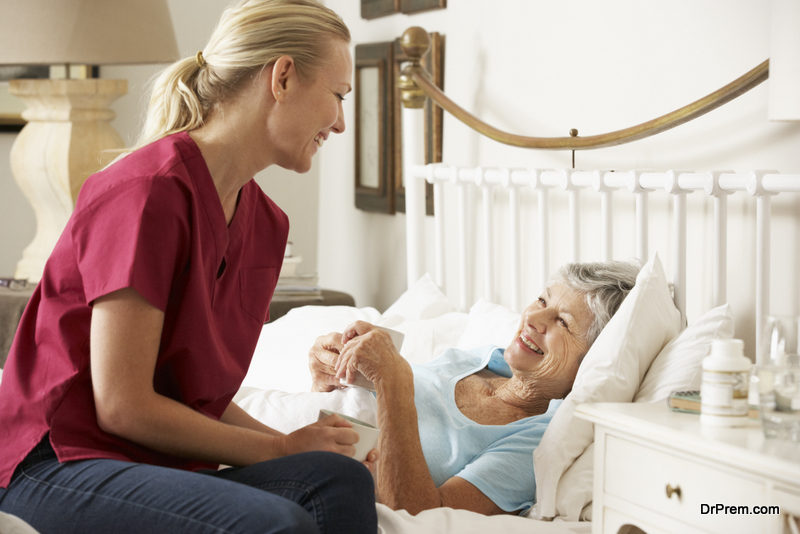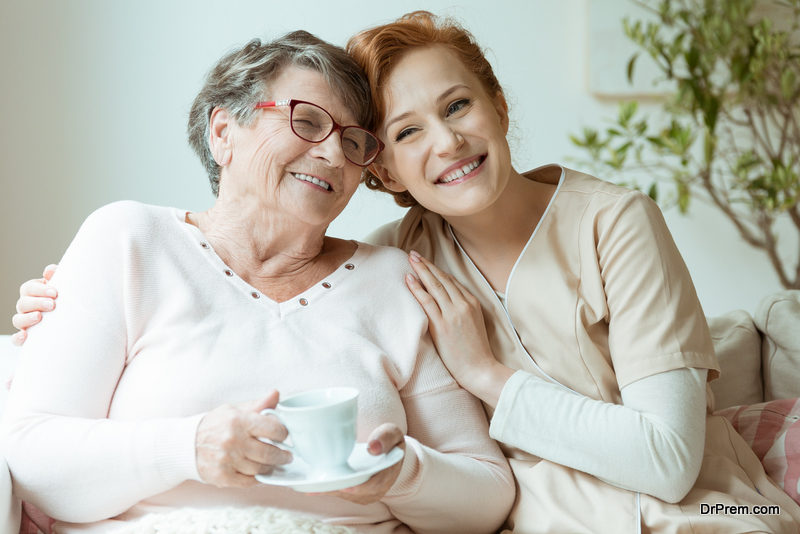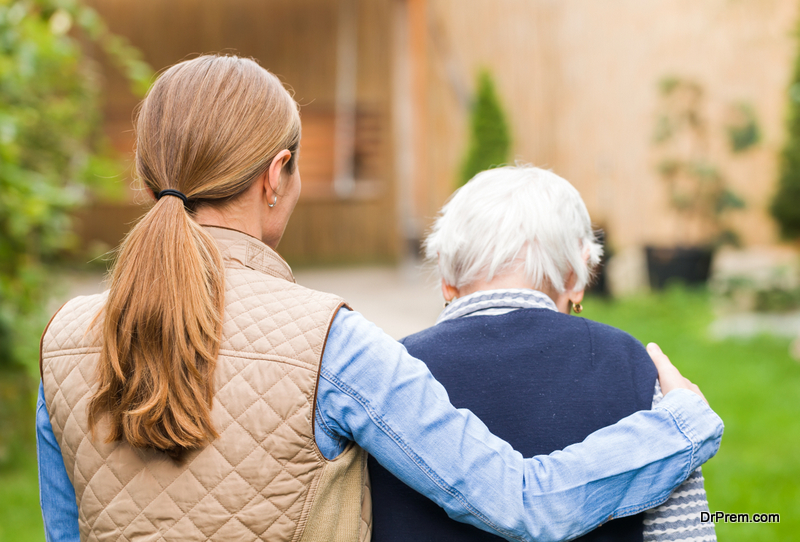No one wants to face their own mortality, let alone that of their loved one. Do you have elderly parents who are starting to show clear signs of aging? Are they constantly at the doctor with new, more serious ailments popping up? Are you worried about them living alone? The first step to helping your aging parents is by shaking your denial that they’re “fine” or “invisible”. At a certain age, everyone needs help. And recognizing this fact is the first step in getting your loved ones the care and support they need. Keep reading to discover five signs that your aging parents are in need of outside assistance.
1. They’re Becoming Forgetful
 This is one of the first, and most common, signs that your loved one may need intervention. Memory loss is a natural part of aging. In fact, dementia affects 50 million people worldwide to different degrees. Because dementia is a degenerative disorder, it starts out mild but progressively gets worse — with no known cure. Here are some common signs of onset dementia:
This is one of the first, and most common, signs that your loved one may need intervention. Memory loss is a natural part of aging. In fact, dementia affects 50 million people worldwide to different degrees. Because dementia is a degenerative disorder, it starts out mild but progressively gets worse — with no known cure. Here are some common signs of onset dementia:
- Confusion
- Inability to remember important dates or information
- Irritability/Frustration
- Inability to perform daily tasks
- Depression/Withdrawal
As memory loss progresses your loved one may forget the details of a conversation you just had, or even your name. They might recall past events in a way that you know isn’t accurate. In more serious cases, dementia patients lose the ability to eat, speak, or perform simple tasks. This happens as the breakdown between the brain and the body progresses. If your loved one is exhibiting mild memory loss now, it may be a sign of something more serious developing.
2. They Keep Falling Down
Along with memory, coordination and balance are two more skills that often fade with age. Has your loved one become more clumsy recently? Things like dropping items, tripping, a change in depth perception, and the need to hold onto furniture and railings while walking are all signs that your loved one may need help. Here are some shocking statistics from the National Council of Aging about senior citizens and falls:
- One in four people over the age of 65 falls at least once each year
- Every 19 seconds, an eldery patient is treated at the hospital due to a fall
- One senior citizens dies every 19 minutes as the result of a fall
Lack of balance and coordination can be dangerous (or even deadly) for elderly individuals. That’s why it’s so important to take notice of your aging parent’s ability to move around. A cane, walker, or even wheelchair might help keep them stable and prevent a frightening, or life threatening, injury.
3. They Were Recently Diagnosed with a Serious Condition
 Is your elderly parent extremely active, spry, and chipper for their age? There are countless senior citizens who continue working, exercise regularly, and have active social lives. But all it takes in a simple diagnosis or injury, to completely turn their lives upside down — and yours too, as the adult child responsible for their care. If your aging parent recently incurred an injury or was diagnosed with a life-altering medical condition, it might be time to hire assistance. Injuries for senior citizens are far more serious than for middle-aged adults. Not only is their ability to heal much slower, but often times, one issue is a catalyst for several others. A serious medical diagnosis isn’t uncommon for adults over 65. Things like heart disease, dementia, cancer, or even a stroke can completely alter your aging parent’s ability to live alone. If their needs surpass your ability to care for them, hiring an in-home nurse is a viable option. Nurses have medical expertise and are specifically trained in caring for elderly patients. The good news is, with the proper treatment and medications, your once active parents might eventually return to their former lifestyle!
Is your elderly parent extremely active, spry, and chipper for their age? There are countless senior citizens who continue working, exercise regularly, and have active social lives. But all it takes in a simple diagnosis or injury, to completely turn their lives upside down — and yours too, as the adult child responsible for their care. If your aging parent recently incurred an injury or was diagnosed with a life-altering medical condition, it might be time to hire assistance. Injuries for senior citizens are far more serious than for middle-aged adults. Not only is their ability to heal much slower, but often times, one issue is a catalyst for several others. A serious medical diagnosis isn’t uncommon for adults over 65. Things like heart disease, dementia, cancer, or even a stroke can completely alter your aging parent’s ability to live alone. If their needs surpass your ability to care for them, hiring an in-home nurse is a viable option. Nurses have medical expertise and are specifically trained in caring for elderly patients. The good news is, with the proper treatment and medications, your once active parents might eventually return to their former lifestyle!
4. Their Living Situation Recently Changed
Have you ever heard of someone dying of a broken heart? While this is a phenomenon at best and there’s no proof that it actually happens, there are many instances where when one partner dies, the other one ends up dying shortly thereafter. This is most common in elderly couples who have been together for decades. Has your elderly parent recently lost the love of their life? Have they gone from living with a spouse to now living alone? Or did they live with a family member who sold their home or moved out? If your parent’s living situation recently changed, they might need more help than either of you realize. Depression affects more senior citizens than most people realize. Many factors come into play – from facing their own mortality, to frustration over the inability to perform tasks they once could, to simple loneliness. Don’t let your aging parent fall victim to depression. If your aging parent is now living alone due to a change in their household structure, you need to make some changes too! This might mean visiting them more often, hiring a companion, or making space for them in your own home.
5. Unkempt Appearance and Household
 One of the first signs that your loved one is no longer capable of taking care of themselves is when their home and physical appearance begin to deteriorate. This can happen for several reasons, but most commonly it is due to both memory loss and the inability to physically perform certain tasks. If you’re noticing old or spoiled food in your parent’s fridge, unpaid bills, or a dirty home, it likely means your parent needs help to keep up with their household responsibilities. Avoid taking on all of these tasks yourself. This can lead to placing yourself in a bad financial situation. Try hiring a cleaning and food delivery service. Set your parents up with automatic bill-pay online. In terms of their physical appearance, if your loved one isn’t dressing themselves correctly, always wearing soiled clothing, or smells of body odor, you may need to intervene. Offer to do their laundry for them or take them to the salon for the day to “freshen up”. You can also create a chart or calendar to help remind them of important daily tasks like brushing their teeth and showering.
One of the first signs that your loved one is no longer capable of taking care of themselves is when their home and physical appearance begin to deteriorate. This can happen for several reasons, but most commonly it is due to both memory loss and the inability to physically perform certain tasks. If you’re noticing old or spoiled food in your parent’s fridge, unpaid bills, or a dirty home, it likely means your parent needs help to keep up with their household responsibilities. Avoid taking on all of these tasks yourself. This can lead to placing yourself in a bad financial situation. Try hiring a cleaning and food delivery service. Set your parents up with automatic bill-pay online. In terms of their physical appearance, if your loved one isn’t dressing themselves correctly, always wearing soiled clothing, or smells of body odor, you may need to intervene. Offer to do their laundry for them or take them to the salon for the day to “freshen up”. You can also create a chart or calendar to help remind them of important daily tasks like brushing their teeth and showering.
No one wants to see their loved one struggle. And watching your elderly parents go from strong sources of support and comfort to feeble and in need of your help can be very difficult. But now’s the time to be strong! Your aging parents need your love and support. Be aware of these (and other) warning signs that your loved ones might need more assistance than they’re willing to admit.
Article Submitted By Community Writer




